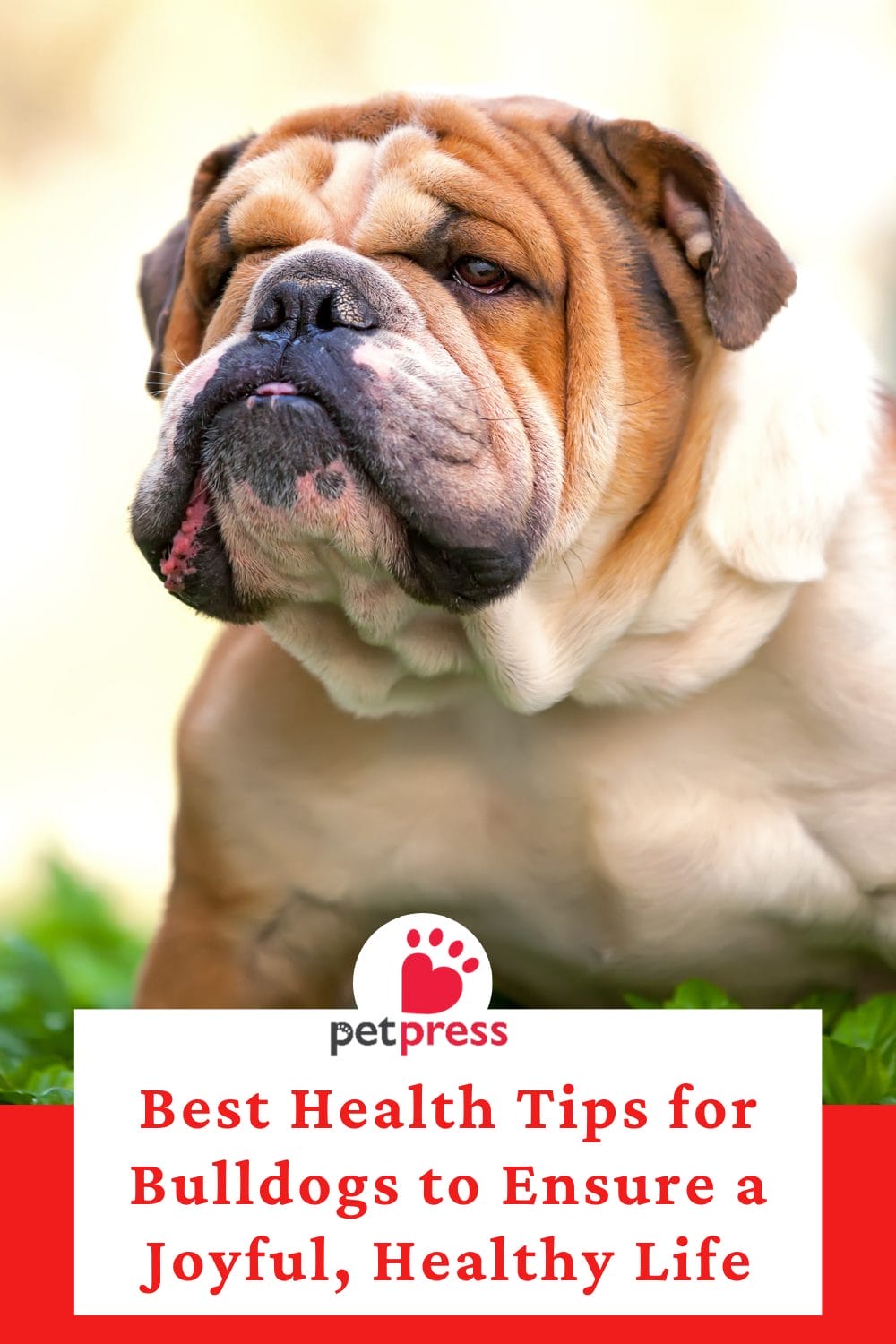
Bulldogs, with their distinct and lovable charm, capture the hearts of dog lovers everywhere. Known for their gentle demeanor and unique appearance, they stand out among dog breeds. Embracing the best health tips for Bulldogs is key to their happiness. It ensures they live a life full of tail wags and healthy snuggles.
Caring for a Bulldog brings joy and a bit of responsibility. Their unique needs demand specific attention to keep them bouncing and joyful. A happy, healthy Bulldog is a source of endless love and laughter. Let’s dive into how we can ensure our Bulldog friends enjoy the vibrant, carefree life they deserve.
What Do You Need to Know About Your Bulldog’s Health?
Bulldogs are not just any dog; they’re a breed full of character and personality. But, their distinct looks come with specific health concerns. Knowing these can help your bulldog lead a more joyful, carefree life.
Unique Health Challenges for Bulldogs
Bulldogs face more health challenges than other breeds. Their adorable flat faces, known as brachycephalic features, can cause breathing difficulties. Also, their skin folds are adorable but require regular cleaning to prevent infections.
- Breathing issues: Due to their short snouts.
- Skin infections: Caused by moisture in their skin folds.
- Joint problems: Especially as they grow older.
Importance of Knowing Your Bulldog’s Health Requirements
Understanding your bulldog’s unique needs is crucial. It’s not just about love and cuddles; it’s about ensuring they have a quality life. Regular vet check-ups and a lifestyle tailored to their needs can make all the difference.
- Regular vet visits: To catch any issues early.
- Appropriate diet: To manage their weight and avoid obesity.
- Gentle exercise: To keep them fit without overexertion.
By paying close attention to the health needs of your bulldog, you’re not just being a responsible owner. You’re also ensuring that your four-legged friend enjoys every moment with you.

Complete Care Guide for Your Bulldog
Owning a Bulldog brings a unique set of joys and responsibilities, especially when it comes to their comprehensive care. Let’s dive into how you can keep your Bulldog in tip-top shape.
Diet and Nutrition: Feeding Your Bulldog Right
A balanced diet is crucial for your Bulldog’s overall health. Focus on key nutrients such as protein, for muscle health, and fatty acids, which promote a shiny coat.
- High-quality protein: Chicken or fish as the main ingredient.
- Essential fatty acids: Like Omega-3 for skin and coat health.
- Limited treats: To prevent obesity, which is common in Bulldogs.
Exercise and Physical Activity: Keeping Your Bulldog Moving
Bulldogs are not the most active dogs, but regular, moderate exercise is vital to prevent obesity and maintain joint health.
- Short walks: Ideal for their energy levels.
- Playtime: Keeps them engaged and active without overdoing it.
- Avoid hot weather: Bulldogs can overheat easily due to their brachycephalic nature.
Regular Veterinary Visits: Preventative Care Is Key
Routine check-ups with your vet can catch health issues early. Preventative care is especially important for Bulldogs, given their unique health challenges.
- Annual check-ups: For a comprehensive health assessment.
- Vaccinations and parasite control: To prevent common diseases and infestations.
- Dental care: Regular teeth cleaning to prevent dental issues.
By embracing these care essentials, you can ensure your Bulldog lives a healthy, joyful life. Remember, a well-cared-for Bulldog is a happy Bulldog and a source of unmatched companionship and love.

Special Attention to Bulldog’s Respiratory Health
Bulldogs are special in every way, including their unique respiratory system. Their adorable flat faces can make breathing a challenge. Understanding this can help us create a better environment for them.
Understanding Bulldogs’ Unique Respiratory System
The distinctive look of a Bulldog comes with a price. Their short nasal passages and narrow tracheas are part of what veterinarians call “Brachycephalic Syndrome.” This condition requires us to be vigilant about their respiratory health.
The short nasal passages found in bulldogs often make it harder for them to breathe. Additionally, their narrow tracheas can contribute to breathing difficulties, further complicating their ability to take in air comfortably.
Tips to Ensure a Healthy Breathing Environment
Creating a comfortable space for your Bulldog is crucial. Here are a few tips to help your Bulldog breathe a little easier:
- Keep them cool: Bulldogs are more susceptible to heat due to their breathing difficulties. Ensure they have a cool, shaded place, especially during hot weather.
- Avoid overexertion: Gentle exercise is key. Avoid strenuous activities that can make breathing harder for them.
- Maintain a healthy weight: Extra pounds can put additional pressure on the respiratory system.
Skin and Coat Care for Bulldogs
Bulldogs are unique, and so is their skin and coat care. Keeping their skin clean and their coat shiny doesn’t just make them look good; it keeps them healthy too.
Best Practices for Grooming Bulldogs
Grooming your bulldog is more than a beauty routine; it’s essential for preventing skin issues. Here are some top tips:
- Regular cleaning of skin folds: Use a damp cloth to gently clean between their folds.
- Bathing: Monthly baths with a dog-specific shampoo to keep their skin clean without drying it out.
- Brushing: Weekly brushing removes loose fur and spreads natural oils, keeping their coat glossy.
Significance of Maintaining a Clean, Healthy Coat
A clean coat is your bulldog’s first defense against skin infections. It also means less shedding and a fresher smelling companion. Plus, grooming sessions are great for bonding with your bulldog.
- Prevents infections: Regular cleaning reduces the risk of skin problems.
- Minimizes shedding: Keeping their coat in top shape means less hair around the house.
- Strengthens bond: Grooming is quality time spent with your bulldog.
Incorporating these grooming practices ensures your bulldog not only looks their best but feels great too. After all, a healthy bulldog is a happy bulldog.

Early Detection of Common Bulldog Health Problems
Keeping an eye on your bulldog’s health can fend off potential issues before they become major concerns. Being proactive is key.
Recognizing Signs of Potential Health Issues
Recognizing signs of potential health issues in your bulldog is crucial for their well-being. Keep an eye out for unusual behaviors such as difficulty breathing, excessive drooling, or a reluctance to engage in exercise, as these could be indicators of underlying health problems.
Breathing difficulties, for instance, might suggest respiratory issues, while lethargy could be a sign of joint problems or even heart issues. It’s important not to hesitate when you notice anything amiss with your bulldog.
When to Seek Veterinary Assistance
Seeking veterinary assistance promptly can greatly influence the outcome. Regular check-ups are vital for keeping track of your bulldog’s health, and immediate visits to the vet are necessary if sudden health issues emerge. Early intervention is key to managing any health problems effectively.

Mental Health and Socialization
Bulldogs, like humans, need a balanced diet of physical and mental stimulation. Keeping their mind active is just as important as keeping their body active.
The Importance of Mental Stimulation for Bulldogs
Mental exercises can prevent boredom and destructive behaviors. Simple games or new tricks can keep their minds sharp.
- Puzzle toys: Great for mental exercise.
- Learning new commands: Keeps their brain engaged.
Socialization Tips to Foster a Well-Adjusted, Happy Dog
Well-socialized bulldogs are more likely to be confident, happy dogs. Start socialization early to help them develop.
- Puppy classes: For learning and socializing.
- Regular playdates: Helps with social skills.
Remember, keeping your bulldog both physically and mentally healthy is a journey filled with love and fun. Share your experiences and tips with fellow bulldog lovers. Together, we can ensure our bulldog friends lead the happiest lives possible.
Wrapping Up: A Bulldog’s Guide to Happiness
In conclusion, understanding and promptly addressing the health needs of your bulldog is paramount to ensuring they lead a happy, vibrant life. By staying vigilant for any signs of distress and maintaining regular veterinary care, you can significantly enhance the quality and longevity of your bulldog’s life. Remember, the key to a healthy bulldog is a combination of love, care, and timely medical attention. Cherish every moment with your loyal companion, and let’s work together to keep them bouncing with joy.
FAQs for Bulldog Owners
A balanced diet is key! Look for high-quality dog food rich in proteins and with limited fillers. Considering Bulldogs can be prone to obesity, keep an eye on their calorie intake. Don’t forget fresh water, and maybe sneak in some healthy treats!
Despite their couch-potato reputation, Bulldogs need daily exercise to stay healthy. Aim for two 15-minute walks each day. Keep activities light to avoid overexertion, especially on hot days when they’re prone to overheating.
Absolutely! Bulldogs are known for their gentle nature and strong bond with families. They generally do well with kids, offering a mix of protectiveness and playfulness. Just ensure both kids and dogs are taught how to interact safely.
Bulldogs are sensitive to heat. Keep them in air-conditioned spaces during hot spells, offer plenty of fresh water, and avoid midday walks. Cooling mats and shaded outdoor spaces can also help beat the heat.
Bulldogs can face respiratory issues, skin infections in their folds, joint problems, and obesity. Regular vet check-ups and a keen eye on their day-to-day wellness are crucial for early detection and management.
Dive into more tail-wagging reads and fetch our other fun-filled articles!
Wonderful Facts About English Bulldogs
14 Reasons Why English Bulldogs Are The Absolute Cutest
14 Fun Facts You Didn’t Know About Bulldogs
- Does Cat Litter Melt Ice? The Complete Guide to Winter Safety - January 30, 2026
- Happy Tail Dogs: Understanding This Common Canine Condition - January 29, 2026
- How Cold Can Outdoor Cats Handle? Feline Winter Safety - January 27, 2026


GIPHY App Key not set. Please check settings